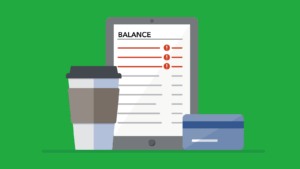Divorce can be stressful and complicated. When you add credit card debt to the equation divorce gets way more complicated.
Couples who are contemplating or undergoing a divorce need to proactively address matters related to credit card debt. Without a clear understanding of the credit card accounts established during the marriage, you risk facing poor credit following the divorce.
Determine the Type of Credit Card Account

Determine whether your credit card debt is individual, joint or an authorized user account. It’s possible to open credit accounts, while married, and that account be considered an individual account.
Individual Credit Card Accounts
You may have a separate credit card that only you are responsible for paying, even if you are married. Generally, during a divorce, you are only responsible for credit card debt that is in your name, or that you co-signed for. If your husband has a credit card account solely in his name, you are typically not responsible for that debt in most states. However, there are exceptions, particularly in community property states (like California, Arizona, etc.).
In community property states, all debts acquired during the marriage are considered community debts, regardless of whose name is on the account. So, even if the credit card is in your spouse’s name only, if it was used for marital expenses, you could be responsible for a portion of that debt, typically 50%.
Joint Credit Card Accounts
Joint or co-signed accounts means your income, financial assets, and credit history along with your spouse’s were considered for a joint account. Both parties are responsible for payment of the debt. The creditor will report the account history to the credit bureaus in both the spouses’ names.
Authorized User Credit Card Accounts
Determine if you are an authorized user. Spouses that are authorized users are typically not financially held responsible for credit card debt. Although the account history may appear on the credit report of the authorized user which includes on-time or late payments, the authorized user is usually safe from being pursued for incurred debt.
Step-by-Step Checklist
Now that you’ve determined what credit card accounts are single, joint or authorized users, here are the next steps to follow:
-
Get your free credit reports (AnnualCreditReport.com).
-
List all joint and authorized user credit card accounts.
-
Close/Cancel joint accounts or convert to individual ownership where possible. Canceling a credit card even if they’re unpaid, you should cancel the account which will prevent either spouse from running up further debt. Canceling joint accounts is a sure way to avoid bad credit after divorce. Former spouses who run up bills and don’t pay them can hurt their ex-spouse’s credit histories on jointly-held accounts.
-
Make a plan for joint debts and ensure both parties keep up with payments until closed or refinanced.
-
Remove your ex as an authorized user from your accounts and vice versa.
-
Set up new checking and savings accounts along with credit accounts solely in your name.
-
Update all payment info for auto-pay bills.
-
Monitor your credit reports monthly for a year after divorce.
Why Canceling Joint Credit Card Accounts Is Important
Let’s say your ex-spouse files for bankruptcy on that joint account. You now have the responsibility of dealing with a bankruptcy. Even though provisions can be made in the marriage settlement agreement which holds your spouse responsible; enforcing that agreement means going back and forth to court.
Avoid unnecessary surprises and problems by canceling joint accounts; and, if possible, paying them off before you divorce. Save yourself time and money by working out credit card debt before you divorce — it will help you avoid bad credit after divorce.
Consult An Attorney About Joint Debt
Divorce decrees do not remove liability for joint debts in the eyes of creditors. Even if the decree assigns debt to one ex-spouse, both parties remain legally responsible until the creditor agrees to remove one name or the debt is paid or refinanced. Here are strategies to tackle joint credit card debt:
-
Refinancing shared credit cards into one name if allowed by the credit card issuer or request the creditor to convert joint accounts to individual accounts.
-
Pay off and close joint accounts before the divorce is finalized.
-
Keep written records of any agreements with ex-spouses and creditors.
How Divorce Can Harm Credit Scores
Here is how divorce can harm credit scores if not done correctly:
-
Missed payments of joint or authorized user credit accounts during transitions.
-
Confusion or disputes over debts.
-
Changes to income and budget.
Steps To Take If Your Credit Is Already Ruined
Start rebuilding credit as soon as possible. Damaged credit can limit your ability to rent, buy a home, or qualify for loans. Delaying rebuilding efforts means longer periods of denial or high interest rates.
Utilize secured cards. It’s a quick, sure way to build positive credit quickly as long as payments are made timely and account balances kept at a minimum. Here is how they work:
-
You apply for the secured card and make a cash deposit (for example, a $300 deposit generally gives you a $300 credit limit).
-
You use the card for purchases just like any regular credit card, up to your set limit.
-
Each month, you receive a bill and must make at least the minimum payment. If you don’t pay off the balance in full, interest will accrue just as with other credit cards.
-
Your payment history and card usage are reported to the major credit bureaus (Equifax, Experian, TransUnion), so using the card responsibly builds or rebuilds your credit over time.
-
If you close the account in good standing or are upgraded to an unsecured card, your security deposit is refunded.
Open credit-builder loans. Credit builder loans are a simple, structured way to demonstrate responsible financial behavior and rebuild your credit history with minimal risk. Here is how they work:
-
When you get a credit builder loan, the lender sets aside the loan amount in a secure account, such as a certificate of deposit or savings account. You do not receive the money upfront.
-
You make fixed monthly payments (which include principal and interest) over a set period, usually 6–24 months.
-
Once all payments are made, you get access to the funds—often with some interest earned
Frequently Asked Questions (FAQ):
1.
No, divorce alone does not directly affect your credit score. However, missed payments, increased debt, or changes to joint accounts stemming from the divorce can hurt your credit.
2.
Both spouses remain legally responsible for joint debts—even if a divorce decree assigns the debt to one person. If your ex-partner misses payments, your credit can also be hurt. It’s best to pay off, refinance, or remove your name from joint accounts if possible.
3.
-
Get copies of your credit reports from all three bureaus.
-
Make a list of all joint accounts, loans, and credit cards.
-
Work with your ex-spouse and lenders to close or convert joint accounts.
-
Ensure all debts assigned to you are paid on time.
-
Monitor your credit for errors or unauthorized changes.
4.
Generally, you can only remove your name through refinancing the loan in one person’s name or selling the asset. Lenders won’t simply remove a co-borrower at your request.
5.
Contact the lender immediately. Your credit is still at risk if your name is on the account. You may need to make payments to protect your score, then seek legal recourse through the courts to recover the money.
6.
If you make all payments on time and keep debts low, you may see improvement within a few months. Serious damage, like missed payments or default, can take years to fully recover from, but consistent positive habits will help.
7.
If you have complex debts, credit damage, or disputes with your ex, a nonprofit credit counselor or family law attorney can provide personalized help and negotiate with creditors on your behalf.
8.
Research local banks or credit unions and open checking, savings, and (if needed) credit accounts solely in your name. Apply with your individual income and credit history.
9.
-
Free credit reports: AnnualCreditReport.com
-
Legal help: American Bar Association Lawyer Referral Directory
-
Financial counseling: NFCC (National Foundation for Credit Counseling)
-
Emotional support: DivorceCare and local support groups
If you have additional questions or concerns about protecting your credit during or after divorce, consider reaching out to a certified financial or legal professional.























